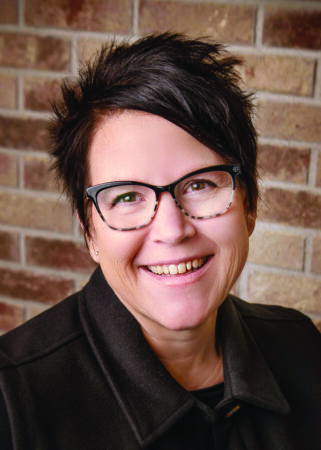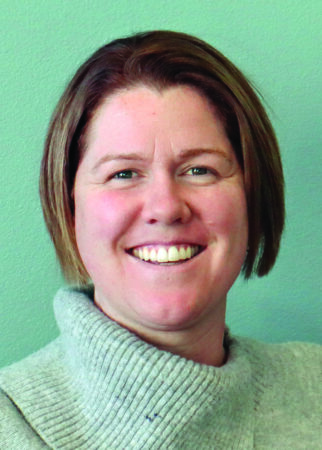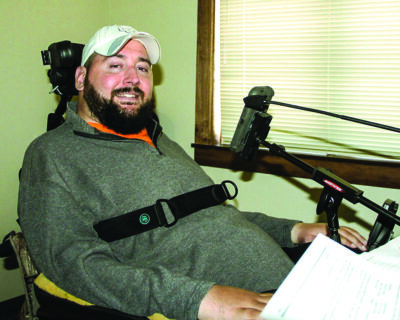- Brad Nelson has lived with three roommates in one of CCRI’s 34 community homes for more than three decades. Photos/CCRI.
- Shannon Bock CCRI Executive Director
- Liz Mars CCRI Supportive Housing Specialist
- Mitch Benson has lived in CCRI’s supportive housing since 2007 after a car accident made him a quadriplegic. He is also employed by the agency’s business office.
Nancy Edmonds Hanson
It’s been nearly 50 years since a group of parents organized to offer their children with disabilities an alternative to institutionalized care. Their efforts led to a group home in Hawley in 1977. Fifteen service providers provided a home for eight adults in that first residence. Three years later, a second was established in Moorhead.
That modest genesis almost 50 years ago launched one of Moorhead’s largest and most successful agencies – one that supports rewarding independent lives for more than 400 adults and children with intellectual, developmental and physical disabilities, as well as clients facing mental health challenges. It employs a staff of 540, while seeking applicants to bring their number to 600.
Today CCRI – Creative Care for Reaching Independence – is making life better for more than 400 clients and their families. One hundred eight of them live in the nonprofit’s 35 residential service settings, most in four-person homes scattered throughout Moorhead plus the first in Hawley. Others live independently or at home with their parents. They receive a broad range of personalized, life-enhancing services both in their homes and at CCRI’s headquarters at 2903 15th St. S., many of them from staffers who work around the clock to provide for their daily needs, comfort and safety.
The organization, when fully staffed, is the city’s sixth-largest employer, with an annual budget of $2.5 million. Much of the funding comes from federal programs administered through the state of Minnesota. But contributions from businesses and individuals play an important role, too, says executive director Shannon Bock.
“The state funds the basics,” she says of the housing and care CCRI clients receive. “We count on our donors for the funds for all the extras that so improve our clients’ quality of life.” Their contributions, too, help sustain some of the agency’s services: “Last year, fund-raising was what enabled us to keep our mental health program viable.”
Shannon points out that the direct service providers who support clients’ daily living range in age from 16-year-olds to retired adults looking for a way to contribute. She is proud, she says, of the long tenure of many employees. More than half of the team has been with CCRI for at least three years; 20% have worked there for ten years or longer. She herself is one of them; she joined the agency in 1994, served as director of operations from 2000 to 2011, and has headed it for the past 13 years.
Supportive housing specialist Liz Mars is another veteran. She joined the agency’s supportive living services contingent in 2012 while attending NDSU, a role that included leading “life enrichment” activities like summer camps, dances, Bingo, the annual prom for clients and every-surprising Adventure Thursdays that might include crafts, cooking, birthday parties or karaoke. She brims over with a wealth of memories, like taking residents to Disney World “They’re those little extras that make your life brighter and more rewarding,” she explains.
In her present housing work, Liz has helped a caseload of 29 clients in the past year find or sustain independent housing. From working through the paperwork to helping them master the basics of being a responsible renter, she typically spends four or five hours a week with them. “Almost all of my clients have experienced long-term homelessness,” she says. “I meet some of them in the park or out on the street. I have gotten to see so many of them accomplish things they never thought they could and reach the goals they’ve set for themselves … moving toward independence.”
According to Shannon, about 60% of CCRI’s clients have intellectual disabilities. Fifteen percent have physical disabilities. Twenty-five percent have mental health disorders, often combined with other impairments.
Brad Nelson, 59, is among the largest group. He lives with three other men in one of CCRI’s neighborhood residences, with a rotating roster of round-the-clock service providers.
Brad was singing a Johnny Cash standard while waiting for karaoke to begin one afternoon in early February. Accompanied by service provider Izzy Olsen, a junior psychology major at NDSU, he shared a favorite memory: riding the bus to St. Paul for Disability Day at the Minnesota Capitol, along with other clients. “We want more money for staff,” he stated, “so they will stay around longer.”
A native of Thief River Falls, Brad was sent to the Regional Treatment Center in Fergus Falls when he was 11. He lived there until moving into an apartment in Moorhead, then CCRI’s first accessible home in Moorhead.
“I love CCRI very much,” he says. What else? “I love pop” (brandishing a can of Coke), “the Vikings, the Bison and all the activities. I love my staff and all the clients. I just want to stay here … and be loved.”
Mitch Benson has lived in another of CCRI’s houses built for four clients since 2007. After a car accident left him a quadriplegic in 2006, the Stephen, Minnesota, native moved to Moorhead after lengthy hospitalization and six weeks in a rehabilitation center in Plymouth.
He learned about the program from supported living services director Eric Hilber. “I’d never heard of this place until I talked to him,” he says. “There were just a few things I wanted to be able to do. I wanted to go hunting with my two brothers and my niece. I wanted to be around for those special family moments.” He remembered accompanying his grandmother to visit his great-grandmother in the nursing home when he was a little boy: “I worried that the rest of my life would be like that.”
No, it hasn’t. Instead, CCRI first arranged for him to share an apartment in Moorhead with another client. When his present residence was built in 2010, their input on useful features was welcomed. Today he is one of four roommates cared for 24/7 by a revolving team of caregivers.
A graduate of Northland Community College in Thief River Falls, he was working as an auto technician when his accident confined him to a wheelchair; with CCRI’s supportive services, he completed a degree in business administration at NDSU. Mitch interned in the agency’s business department as a senior and, after graduation, was hired on as a full-time employee. He traveled to the office in a CCRI van until the COVID epidemic. Since then, he has worked from home via the internet using adaptive equipment.
“I liked being part of that office environment– getting out and about,” he admits. But his caregivers make sure he can enjoy other pastimes. He has season tickets for Bison football and gets to attend his young cousins’ sports in Fargo. He enjoys dining in restaurants, declining to name a favorite: “There are too many to pick from,” he notes.
“CCRI has given me a life. I was able to go back to school,” Mitch says, adding with a laugh. “I did a whole lot better than I did the first time around. I get to hang out with my family.
“The team CCRI has put together works hard to make sure that each resident gets to do the things they want to do. I enjoy what I want to enjoy. I get to continue living.”






